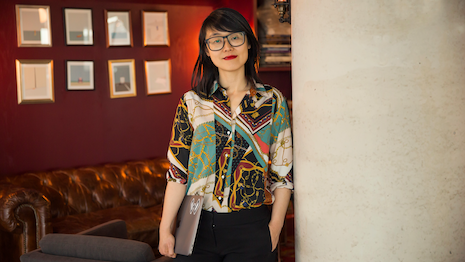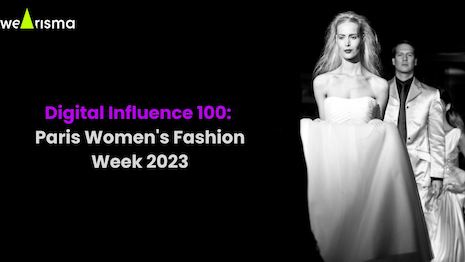By Jenny Tsai
While the COVID-19 pandemic has had a significant impact on the luxury industry, the sector has quickly bounced back.
The world’s top 100 luxury retailers not only surpassed their pre-pandemic revenues by $24 billion in 2021 but last year, the overall luxury industry, goods and experiences included, grew by around 20 percent.
As a result of the pandemic’s severe restrictions on everyday life, a new trend has emerged: revenge buying.
This trend, which is particularly prominent in China, sees consumers indulging in the purchase of luxury goods and services as a form of escapism and self-indulgence, with the first signs visible at the reopening of Hermès’ flagship store in Guangzhou, which generated an estimated $2.7 million in sales in a single day.
Now that China has lifted the remaining COVID restrictions and reopened its borders, we may see another wave of revenge buying drive global luxury sales, and influencers will be in the driver's seat.
Influencers play a leading role in guiding purchasing decisions in Asia, with more than 80 percent of consumers likelier to buy a product if it has been recommended by a social media influencer and 90 percent-plus consumers in China and India following influencers, with Malaysia and South Korea not far behind.
By partnering with influencers who can successfully leverage strategies and content that resonate with local communities, forward-looking brands can grow their influence in Asia Pacific and capitalize on the revenge buying trend.
According to data from WeArisma, January and February this year saw a 925 percent increase in revenge buying mentions and a 2,102 percent increase in engagements on social media in China compared to the same months last year, indicating that the trend is growing.
 Jenny Tsai
Jenny Tsai
How can brands work with influencers to drive sales and desirability in APAC?
To meet new customer demands and increase their share of voice, luxury brands need to refine their value propositions and deploy omnichannel digital strategies to attract the younger generations Gen Y, Z and Alpha, who are set to become the largest buyers of luxury goods, driving 80 percent of global purchases by 2030.
The pandemic has accelerated the trend of online shopping for luxury products, with the number of global online purchases in 2021 doubling compared to the 2019 levels, and boosted the influencer economy, providing brands with opportunities to engage in impactful influencer partnerships.
The recent lifting of COVID restrictions in China uncovered new opportunities for brands to fuse online and offline marketing activations.
Inviting the right influencers to local store openings, exclusive local and international influencer events and fashion shows can not only drive engagement but also grow brand exposure and desirability.
A good example is the luxury brand Loewe inviting influencer Taylor Wang to experience its collection up close after the Paris Fashion Week show.
WeArisma’s Paris Fashion Week 2023 report shows that his TikTok capture of the experience generated an impressive engagement rate of 1,534.4 percent and a media value of $1.5 million for the brand. Media value is WeArisma’s assessment of the potential investment required for an advertiser to generate equivalent impact
Brand ambassadorships and partnerships with local celebrities can not only amplify brands' reach within the APAC markets, but also facilitate entry into specific niches or fields not previously associated with the brand.
When a famous local personality wears a particular brand, it can become a hot topic in the press, helping brands increase their share of voice in crowded marketplaces.
The Paris Fashion Week 2023 report demonstrates how the magazine W Korea’s Instagram post about the arrival of South Korean celebrities and Chanel brand ambassadors Park Seo Joon and Jennie Kim to the Chanel shows generated a media value of $384,100 and 347,900 engagements for Chanel.
Driving luxury sales through live stream shopping
In the Asia-Pacific region, social commerce and live stream shopping have emerged as effective performance marketing channels.
In contrast to the West, where authenticity, differentiation and individualism are key to influencer success, consumers in APAC, particularly Asia, are more comfortable with influencers openly promoting brands and products.
Many influencers have successfully started to leverage live streaming as part of their sales skill set, with live stream ecommerce in China, driving more than $514 billion in 2022 and more than 17 percent-plus of all ecommerce sales.
The focus on entertainment and product demonstrations enables influencers to create different types of content to cater to various buyer journeys.
Existing digital infrastructure around payment and social commerce also plays a key role in facilitating this change in purchasing behavior.
Consumers in APAC, especially in China, are comfortable using social platforms to buy products, and the practice has gained widespread acceptance across many markets and user groups.
This provides international and Chinese luxury brands with opportunities to partner with local influencers who have very specific sales expertise, and can engage with their communities and drive sales in real time.
Livestreaming can not only help brands drive sales in the APAC region, but also serve as an inspiration to the West, where live stream shopping has not yet been embraced.
While livestreams and other types of influencer collaborations can help brands increase influence and sales in APAC, they should not be entered into lightly.
BRANDS NEED TO ENSURE that the influencers with whom they are partnering resonate with their brand values to protect their reputation.
Moreover, it is essential for marketers and advertisers to verify that influencers have driven strong historical performance and that these partnerships will provide clear access to the desired audiences and verticals and drive positive brand sentiment.
Jenny Tsai is founder/CEO of WeArisma, a London-based influencer data and analytics provider helping brands measure and optimize influencer marketing ROI.
{"ct":"ndBOfuPYW0vagynZIDl1tZCqqLKEho4k4K1WEk1RHr\/+T3gTTfgiLfxXjlaG6EFY1M+AC+UiwxWMdcvwSFESHj50kHpkdJXxGwHkMg1B\/WRP\/mKqH9ptF1GtdPwMnN9Kuuo596\/ERF2Pn88XP3JMtMqSOupK4Q\/ahPuvd3s+vCzBJPPuAf5b\/wSWzM4+cqXrd1xCv3TfuiSwI9NENglCcrBC3Ki3XY1JsfIBg8mGHz2laq+nz7hsw7Ss37oaX8Uia0KoYzB51760zxV914kr1dUz6UjXyglBpUj7DmVG5ttq5BxkpcJ8dvd9Kuzk87kmrs3h3SxNrnlwQL6IAjWfgPgi1cdJWSHVwgeinzY5SYQ7yY0N85kbAwd6qRSrDMEYTdg0Je7c+poZd9naCd79RAQNl+yERWElnO5ER8Jgm3qvD0cxI7ND8v+Co1i0JyEjqxP5RozhCQflHK\/bKZs5eVDsLvd2r7cOSmcpv6qScOFV4zqb6oamAvK3FDLTR8itFhD0bk7C9W0o5iWFKNrO+CDYFBiX9Q\/6d3LHkBRkeDinPWrDz9ngfJP4Twd6mBB7EPHgkQE5nqr92OQA5QqOEKStQKfpTlK0qgj9jjzYRBWMZN2Efb\/VqB9o\/oqW4j4YvZrR6yn0gkk5e9Xg43rzehJdNyKYOEvf5\/+iEiOo+\/WxZKss6D9rRwNYLa88hRT4w2RfyDj05WDcWuFCOfrellBUFEIyh3G61eNe4sYo19QE+yISkN1Y3W+q+j69Tjkw2uzRi7FlR\/taBRhorm\/M8bHabOrr\/myYjOzfEpfYCKekTsZw\/UuRUjjuf+tBdO5nO38DuE75fs\/2TXSmndEAGb53VgeUUPB8x2DBhlb3rWW3N2Rg7u1UTnG4XPKUcCKNAOmymeH+5lFx2ZZFYjj5tt7vCattMxt709j4b+6lkO2jFa417grSnSfCjnvN4QH0W0OyL6Mi3\/a+lQkyr7qLm3dZzo+2EBjQ55+rrXg6TtsyJzvTkxJD2EFMqoHqekCE7JZbNfJNK4vdbZS7pTML7UPHu6NGdwq4i+mJj1JCLwIljEhzN\/QIkikXFM8HR8nOQ9sVrewjU9XTzMyWQqpW4tmy2HRw8\/hmSXkD0\/jdRAnLTa5Gh\/MCYwEKrHQ4wmlUD+mQ9RyY3NMVnj7faycwStjyC+Ec7ueT0oZrw3Vn0ctqEb1LUfWfqCwdF2kL5qS8xH9153fnRTGfy3yOeqI1tKnRYPwT323McAgTilTRnN99gjdFNlO3r7oZ0hdBUarz608+E6UrbA5shR7nzshkPbBbN2KmKqRulXW5H9JO6rjjNGX9mgIp2Y5JOjlkqMVlU+dQ5zqEVaGR\/whX9f7SMNv\/e59nsyHzNVUh53n6MhHVuJuAFup5WpMsryjtTg2OGL3vSdihxjIevy2Y0J8qVXYdOsPxxoExb3rlBLTh8h4AzAahh7uvmLdPd5w9b3JAswdjTV6qE3IBXom+0qARqX4F4RmtXze+OmmlbLDk2IAi+URI0MUZDeiMNP2iKicC1zPpN2UP1C8uUhuTb0gB4T3RMlUxXBEFY1JejIycH\/fMXKqEbLj6Pv39uUmwJY\/S5bH\/3S2e90nKAxOYiG+8F9FYMoSoVQ\/TXfpphROgZg+x7mgBy+KLpYwShNrMioQScXgrJZPPylO7dOYJSQ3xgoQGQhCosNrxl2ItFMyLgH4Uhz6\/kKVYAI1+Z75HG3b9hIidI+qEAhCFKorgBmXGye\/NTr6yMHKzKAYPpo+EEinoO+l6aXgzioAdhoXc+\/\/fxd57fDt+2+g29yy9BxSJD5uJ25DltXSDaL222ML1X3npQy3u\/mHH1i4mCzr9p8lMFavSB70KDt5nwaIrWTSpzaXEMgysisQS7LLKSRLweuT0zex4ERPxkYCWMw1wCals5LGBKxgZpnLShdd5\/8ttGL38KBKsUPBokpgH9pO\/NTYQtHUexEcStT8aLaIHVFeB2hfa5mYq8pPURcQyAX6biC3EInbj1TovczoPzeGvKVEPNJMUxTa2ehjDtYheSomJl2bYPFFHvJ81FkV3YWnuMnRutvuYmHn\/\/l\/5HnaMBIIFDNkc5a4HYiM2m7H+DcsThngAEmhKDFwINzwyddjZOAd9TBYMMgZggDFVk9cWIleVXLX6DOVDA5AFNAZc\/PkvUrJmbqtGj500n2owsrBICf2coBbBSAn\/8GZkY6f4jUs1IFi3\/xx51brWX96n\/uxnSZ1fF6nGU5B50j4+4qsJzRvurqMJk04QM7ISPWrnTI4+UsZ0s9KGfJSPCsQpwRuWLDFf4JtaMHQE\/Jx1HthVhWwfzymjCvEbtHhZ2s6OHQq3mhqVBWnTxMTizSnheARo5npGBrXetPm4J5\/n3q1W1wZYa+1svZLO2rPr2USDoAn2W5D4hulOC60EdOj9W+g+GV5AFz\/7NS1j\/txirb+dOP4U3aSe91\/Zxbll+WN9DtUboJVyj+KeYp9JUSkzl9eGKs9IxhcBT8DVRm3WHAANaMI5iUPeXapclXMz2r6GMht4Ii4+farc47ciDKaZweyBulFinYw+f216CXP1DD4MRwifm4ZybM9mitq98wl6RsYu\/ZKlVzhs7ReILG5QZmOQOe7NPoqP40nRqd3VD4lSCwdpCvfYSMWTJyliR1SMdO\/quoydFDxk8ZhEwAeBnGYrvTVRVdI8VPXFLuvWbdmtg6CPUBdekI\/xUcoAL3ps0DWzrgHOS3DOZb4D12nG7PRXxzLI4B8ig9Vnh356Hr6JvUIx6bTGRrFfgRk3xmxlXbGCUdlTyVpPdcDXqP1ZezFd7nu1FfsT\/oaOCgi+QTRRBPOe6oxgimW4lu4jan2OHW6km6NHBqrWKMsXx59Z1BF2o7cPOQxpBaIZ1iwrw6KoMYzgl3+dTxWtdf+bgCyXHzLVrT7E5FpYgdTYs86NxW85z4kVZwku6k6XVeBc4CLA\/WGXj8teqtPmyP7cSY6p+IU0zuSTfPsKYEpBNDh9l4GVaYxnd1sOtWMNvS4P0yitfYEN4j3uar4+4+W7kMbhPG40GoUDMHrG0FW\/bOw\/nisFc3GviPv46lUuYmznjF2ifD0lXvF69mQjne\/iOQMXSafxAXS7XpLhUugOXgnPbc91esxpyFeXPym4rocq4beUbBwbayrTOO9UYl7UCkOw2MKF+7CmZPGqfRNPJPN6PoMYwKI5SRk4GlWQ0jSskqx7bDH3TkMEBGtTmXPlGx1Yz9ZhYs8hLCBjMNsvAJGIvHwDqHfLwSsTW6AIg6+XpS6jAv9BE7BvlsvSdm8cYJl1hy4ig2O2YTZqE5jM8W8OGhvZQI3P8WCSj9JSKqyLoHttn8K9+KVpcCbZRY\/RMZh9iCyTlHmpj10GUwLGTyJ9a1H66YoVj4ID8oYOgU3HJtxZhTtUyQ6pU2WttpN0r1g3Ytzzp6OIeUbJz8BKMsisnEM8vFrfhn45opsdJbZ+3C7TPTnGgHJzkZFWkqtJZ1ozkpnyb2tD\/pgfzHoJQQCh7L92BPiAKP9j2EOjdws0qxCddbvA+hA53hgVvvVlw1mehUII6ioemnPlcVasu1bpP21bAXY6YqMO\/6RABJ7PXLBIw9EbgWodfC0MQQZ7vvsyOesl\/PZkvovVZnT1qn0XgTq+x5MBPA97NBxkScteV91W1iEbe31V44sjZMUuN8ICKAmPJqKgfr2wNd5mb4DA9+61002H2qfGP4N2BpRXbXm1t3zyWUGeqExRkDdmpUpEXHvNKGAo22yGqJ0OuiyJPU9fXcU\/rDsZKI3abiMi6tNnRe0tO0Fi2gNTEtWI\/4fY3xuP7TlOvkj2FiDoLq7HPNYjMpXGL9XPSd+HMG66iAgo1LY0n2DIsVSU8VsmfhXFd2DuFco7ZZ8Whsgd0R6KS3WzFZKBZQcMfh7S8WlxAY0AVK7lcuysZgUvxFm8PKj+DGxt+rCwOWFQcR3hGgRm0PSV284sy2NxX1cTpOJNL4KNGVLOU5R17gKmGXm3KkoguBYzI5M5Vqf+jaGpyJvmdvh4Fx0duotBL0fGRw\/N31CKkxxPgRlo5nfOF9Mbp707ziTwNRN05GzsagJj4qBz07249wAM93GOITZ5IezQ\/KadBdX+3Z81Zu5MohTzjmg4v98GpTbY6zFyYSszSYxREiOVjK7\/dhva0cpo6\/mmgK3po179pQWZXgWUa1aI85CIZHpOBS1aGgoLeexn1xk\/ZVDqc8N6AMEvv2h0bilG+s5MSuO8BC4nwuVv28fJizrAsLmwczFxFudhNMQHQcL0ic1ktceJ44X6hYksqQYEle4eP\/NVnMkoioy0y3lsKPK1pUdSr0kv7hMe2ebeojDAyvVvCaZuvdrAcG5RblKrr6No+jGQHUTx9YJlbHWpG60L3Kr4mVJLoMvPsNCqRdycmvisIALyqRWxKjD6kujouk\/GEinUy21GOpgUsMNk4S1mktnJJJMKxs3xCIWzE2WE3hwu6qZScRSQeEAR6PAAAThvwA\/tsUg1AP\/k5sArAEd0bMpGIXVPz+ojAw9\/w9tEIKf709OjSlnAVdO00hJ5QProJLo\/dfuefFjkWaXaHByACsNDrWAm+xvbWQWJoc\/VF\/+un9iwcB7BH9qqApHPOiJS470zc8Ck4PG9cC6EyVhdabwQudnlsABOTf47\/NDcX65AYfQigLf8P1AMPWLB4r+pngAZM\/3QwBv4GavBxICsiCRjx3upli600YvqoIZP+2Bfm6rJXuyet0cXEUAMEF6YreXsd6T+\/Lh12LX8QWREWA0dtvnZ8PvAAubXOJvfWxHztwYbO0orBFuUtauNslKBCE8o5gtAvypr8YRz2pChQYroMBpRRtRUU9TGubVC8hqazpNaOiEku4yRFhsQoCEumVtBSG0ynsUJedGHGtQEeX5wZKl\/sfsyTfHjyAMUauU\/0KKMl0ivmGC9qcJEL4L6SNlkVHVq210swz\/QWZXhlYB8BFwcUS+e9ZJTiZ6lYdUZHg33VTJ5NjW90lB2tF76W8\/6hI6mra20eR+9kZShNnElSR8Q+PPt6ggL7bHKCR8y\/owhvh+09Ojf2OlYdoF2cDsfioGpYVEG5os0KDD30M2j5ZRItZaOsYKXHpFH7hUNQWqLenZzw22qS2P\/0IDO0eH26ROO7tHIm3lD8eWMDmnI8Q96f4svCHGKu\/iITdDlQz3Xd452irutV72zAET3kMKGBxqwAmYP9iNIuFNNxuYCkNtb5Jn3XqhkiQHsA5lUiNrcU2PQ6R8aaDGGRmma4Gv2zrHa2B2k149yh79rD9dW69kWAIb+98AU8SEo3LbIqk7G57b+WqjlXTcIhJe2ISnKVbpHHaeZgCebps2RaIYlzbL9kHRkaM\/HOad4BRCmbT5pXb18TfGoavSu\/LzHsLP4eZ\/8AZ2uDwg7695W9oAXSfS1lo\/WY5NDBB8FEz2svIOLMMEk+ii75RXvqb9B1DWCD5z2p5fzL0z8wrad5ppHL36X2kh678m\/3gUAfMK1330+w8urxmn+R3TOYV1D5W92AOli7x1m1EiU692lohy1utkHd7GvP3laXOnGrzZGJJLJBMq94HGhmtqZV+RoU5AC5I7N232yTTPItleUDEmbyaUmNinpwU0mcEv49LvQDGO7ZypSBh50z8jXYY\/K7Q3UyldRkZQ1nTM+agxuP2yqG\/axlwtn4LRGLjlhfuF3h0zxdknhEpSrBQmqwKyIGiU4ARrHrCXe8ScHFgXOSMHDASTizZJgBA5AxlbqS18JzbFWUht6YzcVj5VYuKwojs0IeibzafCFI9Ma4ztFo5gTWJc5ObGl9r4w1qaOnfBe6JdsXvHX83uX1+wgeOfLYJzKXaE7efkEV14NEuQHZ\/4bvr9H7yxKOwYP4zqUwR64cG8o7igD5G054HJ1tTB67VvS\/m2CbP6VaUfP1Gunz6GS3QAWqA00YanY+csHEuUioXjA6xBwTI5juoYN0H84oqMbXAoZZwRHse+5oZfD7Ts5\/vIvGKmpQx3Otgd4qT4iJftkRW\/nbCK3iMlYyTjQAZDSxkBh5L\/o+vDgSj2eBHkMsDfsZGntYIFp6\/ONe7wKwbWTCs41l79a+My7i33jLx8MM9FwXRkcSXxisvfyVK6YlTZEe2bt7GRJHfd23UBxq4XjJsqP5dhLOe7IgWOkzQ4FOIEc\/LP6+ZKO7DmfaHTVDTI042mOF\/qgTH79rgRGpbCHsFaDOUSAr+g2mw\/rwYYScfsHSO3F6apLtQF38yWoWn+xQltqvHFcRwVF7ZiLW+WVPZphNErAIw3QQR\/2mVNRZJhjpiWTDTQh\/QLPPZILsvdPKJhf86GtKVXLmGPUbXFaS9sv6bHvP22q9Oh9SWqJenzmvsBToEtOelNz7Rdm\/MXWVLs4PqtWGcC2Fs5iNDM31jITGbCbMwctX70gTfJecPcXBFxo7xiF9XeROD3dSJnEs5\/8vcJ9C1L\/pv45elpDprW738TsCV+rpKtfxy0eQWef98+VFAqh8p+Kx36vf92B7wut5fikwk2UWEqgD2hQ5TaQue0D95mQvwGTaasXuH9j4ZWk2ei\/E\/oV9SlqbSYu7YFE6ORq76vcUKp6XCC6oOzS\/AlYJ4InbbNZ8wL3tg+hYavCssN20nTVYobSt3awU6RRZJnXL8iycwXnn24P4VfufVecVz6Pwzv8X6XRktWTmoU9iMPkha7ieC6x5C+VCjbO0vluXWkXWEp1p0PelWYudI1V6YlhKmSBtiSkmn3SHxnUJ6hB41jExjMKel455PJmKXfAbz57O\/0oSmyhl2WDTH6rfUUmKsNVjMQq++zuMNmC2P+6fJYw7Oe043FEsnhxWFIZ68ZuQJznNS6hc3MSyb+QlrH4DlWK8dw9sCg3tL9qTaGBMYzf3JiR8JrITPzxV4xaA+o6tgU7R3btPSLpnNNQgnTbJEFpcHpotO1Y\/nJDlKJSVwS1XZ8TQH07qqnXkDG2UrBON4zcPu2C8IA0GdoKy0LzXs+PkXBnSXqh5dVQzTKNQucfozSnA7oRLJQfMBCRgwxTlbj7t\/nF8GJNhmpHgZtPvw36Mt07X9pk4wOj7VaIfyHTOATbYdHZHSfakk2g2s7NUiS6nnSm5K\/sqOf1Jh18lrmPUgFSfEEDnY+lxKR4iM27hodwYoJgYpssxJYr9JSIeQV0yfCmbZaW9MLCN2SlgARdaC4T\/GIbhf3ah880tWfFw24n9BPmw0JclR5PEz44Q1Grx4NOAzAdvpAqPgnwHaZSQLhrznrFiqjOmBxY\/KWgUzSATxakYIcBwmEIicjEeRIyms1LBBuVTktyPVGFmlRb\/pPuum2vnMx\/WqKaFM9f4mMhlLng7fj\/9G50jdKftIJ+3XrybTom7wXnj3ukrbVbsZYGzB9mtvURUU1tTIrgpxBspm2D6sY75\/i3r\/b6ONh1BhEHCnlXCMW08BiPqYqbDox5l40UAemj7F0NvECnm1DWFNMvMVjMOwKvdIAvmjkX\/OPDmTn7e1yATizTOBHR+FZE909OxjGTHbCWGPtWULLdZa7nYjmXwmQHXLLw31QtjGzR\/oih1HblZXhPFGE\/rNg2iuRNHSisKMHQ3cNWXxbmAZ1YxCjcuHMFIfrOk\/uGXncByj1qOfuvzn7m1T9ZI+ACaptEIuoJAbO0yloQ7h778ZA+E+jQ9hlHQj09fB7McI+0aBiI9VAZVz5JPfgt1JkRqb\/IDJ1PGze9+NSW\/hYyM5k+2RsZTqipkO88IzueHN9uHv3skEOdcmLrKM8eGKeSj+4U2M77LCc1UJMzTg27Ic38cSiDrr+coAIEMjVcJhtmKA9icLpypdXjEk8LGUk8vJ4\/T++lWRdpJD\/un1xsWbjZ\/59MOE32InSbdWK7zWgNG5WwL9ECxZZkC6wowcrppp92Gb8LP+xzYnIGqU6BPwwNDaZAgl70U0fucHb5tjuJLCKjTsllrxR9jd8Xmm5EI5ZytYzdK7poZ8Lkd1IP+Bx6iQ3U\/7wFfYtutty3ZieV64HV\/yww0LkKFf5A3P3SfwXcPQ0XosaDTR\/Jhbsb0NI7506hgaBt2maLnjslqEGnbVlnOauLta+CPkgexJxjE1TYaNBJKt+j+5XYEHA3rlB\/5lb8dJTuTDL3OJaS\/8CculBwCjAvPXxqlBoLytY7Hsy5Pmp3PJe4Yo0xe2Xc3Ueu4w4xgEpSPzrA+i3i8KRGe2Nw8TjyTup5egltfugAcYiGk65N1oCZKCowd5BPO\/WkkJunfO0RnJpv1Z18uZY0aU6TxJhxdWjsqurMAMeT\/m1kts+cox8jgxxvZumWr2haJL9b+lMRlj1r+K6zu4TpJXXhb62urSZ5sdpvzjJvRyQAVpERAXd9gxvj\/AKOE22fGLqq9NZXxzX\/pMRWxFm9FpIrfFp5ci1nJXuqoduUdkZJWbErSxpTCGTX0PDT\/f7kV4u4+BrH3jc99zJNz00ZW9Kq239sCA4GjGz6OG+Hv\/jIuUAqUfs7uPO0vvRkIr3E5h4CsQwG9Dyon\/Si3clcUMengDvgZb7ugzlzVyMHz3lEyLN0VyuelWOLcTa\/GP9eCQWykFzPmEL4ryqGAY0RHSunsTiU7ow9tlVdGDA2\/mrxRIjDWkRSkkYYC7fiimAjbZxirtTgpB8f7YFJUY8\/wqv3FeHfXGSX0OFuKeOTU\/LczZq8u+fQ3eO2+6bJHZOmNLnJjeXy0DvRghl69aVFxVU2vLOBboh895\/3eEgEqWigJgejF+O4SNLMIa5k7H6KGC2w7CKgBXC9ZPhGMSv7qyeqOf2Q7LWkvW6LDrb0Lyw+QuSZscSjSK8mu4LpB1LMxy7lMvY+a+t4vd7BlZVZReJ8Os1eaSRMiT5c9DRa7GXbq9RAvYj8FlICFTAJ6SxEmzV4fncOG\/e+N4ZOUleE3T1ycuHG4KdkyJ9oPK7qtmfs8R9uVSwFcDgUh\/lPRj3Y926fYIM9RTyaTRo9k4Q7jZKDaXAgUNUNcFzQZ312J2bmKwHjhNR4w+VSx6wTGoiVXe7lezTMcA\/zjJtucjQI7BY1fwOCYKR5QHpiHkroLffxVXVZ5WESzcJEcJ47Unihk1yQf7jb6JUDJpc2WpS4OawwleRbk71CD4mZqJxTBdoVYEPUSsiWFvOUfL44rVOoxnBFcm3kmPp4iaNSwm5SSNRGwEewdW3X1UIfdr9pvfpRA34vONiB9Fson6oyepxNiP\/QmLvEtucCQ3tygHIpf8nf\/Moe2eupv5ZELn0MMd1K8ma3KNHhbAslxr0+7CTu7\/M1CwrciSzUA4M4phzTN6BY5bh4N\/Lgkn+ZJmPqoZ\/QxSsUqfw16VXHSH\/kTSDJ2xr0O16kPKkzrkwlHmISg5bn4RPlMoNk27Axk2XdwpCIeRWdH7zmCQgZ6PfgiLCeYGt4s7uP3wlIGL3EHn4Ae7GG+uHvWQGdz2ILun4Go1ZH4Yr8E9tmMWvMSUjY0S8+q6q0MEgRN9\/xFtquX3pN2YMhJqxz8W7O62sZEuOJgo5VdY4kaVSLP2puqtF3lV+gpzP\/ThUDFmtIj4JVgPyz38YTo2v9Vj5noAUU+38FMjbMpXrVFqhHAQ\/EK0NzstMrARiOA6ZTUFU1NhIHGJ0Rc++8JW73GWbDORe2TL6Ed7+240\/rYWmj9lsjtMp7BPO78zRazppie6HTt22lJBstW206aZ82yLmoIrW86lDgzpWTF0uEY1XA9RrkQ2CL4rZcO591hCp66gOE7FVxrGJc8AZ+QmJgtRaKPZ3VhKeJhQU0yNOl516LgVdIkoDO7DrNkWkXmw2C5\/G5ydvHzZhOeY8w+\/b15I5c2u5RIR8wA+dM7sUV39Q+EsyEMbqWCW93Q2K8lHCLnBTFsHnjBxZvw9yJIqoZqANwc79P\/FZiuFIykpmz8g1AMa3ZXAByrydT51G75foHS7IkCEfCe4G5ewDuuMDf9+VDMiXAUdcAVqvAHi2Y5+T8PHPL9H+O8Z9UkMOZDkQbUJ27uTJL0p0ZArs8S+c+Cgl0qMDdQ61ATtguMRsAUIgspWicLNR9wHPlQT7IOhVTYnXQ\/Z77Cluu5lsaz3T2\/3Iwe6bDcW+GY0XQdeH4Bfu+emHK4Qsq9ySW0d7VpfHNtyJir9LAVMoydudf0vrXN6pm\/RQGt2xN+Gw+y3cVTgTL2ak9maIL0dNoP8Nos3+09LP0a8O92xnf8k8tBlfStJ8IFptzknn3OXQJX7BV3y7PRt0jsOvi1ZcgVK4d282jdCLHRwFLCoSvUaH4uqO+kw8u1A2mPFdtbgMY0gu8gsF2bKIWojpYSab9dJzlKmpJKi+yIOh1\/JK\/0M5lrD1fo6PeVxIxpU2orYUrEVRGHG8meaUONh9j7Ala+Jlpub9TgLayex5p4BlUWJbiGsIyfI9AURCLbvzJMlLFlcSplU1+SWNuWjiqS9Lcc0qpeSI0Nn9006aGn8mOcY3ZRQev0mqZP1INaoOu\/SHBBUxTNl\/z7rh3JRTxCiiIXzZp7JvKVmPUY\/HomRlPvg\/SsEH6IaAjd5qN2NsUBU6NYUQKUf7a8Oa5fTfoJSMGXdcmb2JKhvDQoQXMEchxT1IMBr0MdLUA1RaSnhcfndeAE21VK6I6CGqxPPnRXvLCk7G7igYnZh42\/ctgpErk\/HNXiUZEo2IB+PIcQb9COd79dWa8Cx3t\/dJ3UUzcNU2+zqJVuhNF0J5P\/nzosvR\/Yaa2dAIE6wyut0tIBXs5UTRc06NZXYZ0YVR5bCUPrQT4NNszow3cVv\/pCrlNJj4lKUHuOiu0Rw665KmHBXsrQbmdxJ18f4\/kQZmtyyexKJOzrWPwRr9BgX7tiNXS9r3FF8k7BRYSAnCqji0tjinAfscBniF9d+gqMVzK8waDJsNR60QqCoem8aozM0fm\/xyuFW0ajq9TnD1tkEpQR0y6UbN2IzOl521eVJFSYZcEFS24nRwdL2s6G2VqMzT5n+\/jHW84z\/EtM3feK82vB\/199mfErWPudPvhU+Wh6mLitomZgwGy9kSGyJlofCH4e1KaCllyHtr+FCZyVjpd\/3oCvrZb+21ORHdVVyZNPFuFi4CMXTlDeHO6X\/yo5AP7tKXTC7rKJqhYPWq0AasidplPhP9FDZ7diXBowvHs0yn8T2H5oJbDzSjuQ5UlA1iLoPlG4FLVfS3l1IXfhBl1cUA1mkd1NmJZKaGRJPko3NK4WjsAlOyAjwfjlvDpTsGM3qf2x6YQ6iG2itq5LnVhJQm826Zat8wEcB+dDW0jWC1u9+TIc12yBVdtSOqAOxF0zKVrAJlt3tEFBH7v8vooimXDc1ubUMlXZx6qKguYKXc1kT6S+VQEre4B7ih2NJcqj8qnXvGfNCsMCjYqhovoQCIS4VJtihIxGUjrW7iDt5nlWvacOqlEVNn99OMwtLb2EjAWlDUzX9RLqJ+qbgMkKM8DxyC7bQKa0vAMMFjCyoD59POPqPBWbjuV4MCt1UpfAQ3tFvzp5vI6QUVz7W4aT2gEAG4lNoU6P4N33HZEvi+G9IZOg0ignaWEvbmHgvoZaCTJIVw8vb19\/toe3di8DbrXXlxjil1ZIusG9sydQQ2lz27yUJDD+gMD7wKs07RC3Gj2dk1XeYWd\/EfioMRhMwFS2yWE+wxFalJHaR3HDW7lmHMk94uKZJwFRqSNO94\/zpk\/0MayUyoE8+rhQJiirKeB8AaQEey2PK1spXD1\/mpMvfgHcSKjgtvruXay6n1BFJXw\/Buk52hm7woR\/\/ytiUpaZcSxWu4AugWqV9qgCMRm1HDgV0D31ymfas57vA+h6\/jsD\/KULCutTPll09BTmzYVaynX6B4XcQoOMyMvneffUbqa5Kr73GRZyKuppfvpvrkjJHtbzfKiPSbPCW38qdJ+hWYdeO7YebxzpXda8MO+OwoEXBqF1ZHYeRS4aVguy8o1189QECOt4u0LrVCwjx9H\/ez2F3I19ZepLNdFvcddGBIXOZvvGbdIXaKFJT\/DiaF0PTIRT9+xMwoaNJNphKror8jrIB3Gl6bAsSydYOcLJ\/XR+5bHxe1JmHiaCEh4","iv":"b59ce646efcb110b13fc1db26d31cd54","s":"098c925238ac9fa2"}

 Saint Laurent, Dior, and Louis Vuitton achieved the highest number of mentions, attributed to successful partnerships with A-list celebrities and supermodels resulting in significant press coverage, per WeArisma's Digital Influence 100 report. Image credit: WeArisma
Saint Laurent, Dior, and Louis Vuitton achieved the highest number of mentions, attributed to successful partnerships with A-list celebrities and supermodels resulting in significant press coverage, per WeArisma's Digital Influence 100 report. Image credit: WeArisma  Jenny Tsai
Jenny Tsai